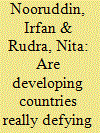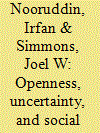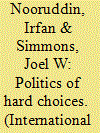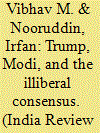|
|
|
Sort Order |
|
|
|
Items / Page
|
|
|
|
|
|
|
| Srl | Item |
| 1 |
ID:
134835


|
|
|
|
|
| Summary/Abstract |
This study evaluates the embedded liberalism hypothesis in a broad swath of less developed countries (LDCs). The authors find that LDC governments pursue a distinct welfare state policy that protects citizens from economic insecurities associated with global market expansion. Specifically, governments use public employment—and particularly employment in civil services and administration—to foster domestic stability alongside market expansion. However, such jobs are targeted to politically salient groups, not poorer groups that might also face increased economic uncertainty postopenness. In turn, public employment shores up public support for openness. The authors' findings suggest that free traders have reasons both to celebrate and to bemoan this LDC embedded liberalism compact. On the positive side, LDC governments are working hard to maintain political support for free trade; on the other hand, the compromise of protecting privileged groups at the expense of others in society raises questions about the long-term sustainability of their strategy.
|
|
|
|
|
|
|
|
|
|
|
|
|
|
|
|
| 2 |
ID:
101689


|
|
|
|
|
| Publication |
2010.
|
| Summary/Abstract |
In 2002, the USA asked all countries to sign agreements exempting US citizens from prosecution by the International Criminal Court (ICC) and threatened economic sanctions if they refused. Some countries yielded to this pressure even after ratifying the ICC Statute, while others chose to honor their original commitments. Why were some countries more responsive to US influence than others? This article provides an explanation of state vulnerability to attempts of influence through the lens of economic sanctions. Assessing the success of sanctions is difficult because of the selection bias in the instances of the use of such strategies observed by the researcher. Since all countries were asked to sign such agreements, one can observe exactly which signed, whether sanctions were enforced, and how quickly countries responded to such pressure. Arguments about sources of influence - shared interests, economic and security dependence, and domestic politics - are tested using an original dataset collected on country decisions to sign bilateral immunity agreements (BIAs). The authors find support for some existing explanations, including relative power and the relationship of dependency, while previously held beliefs about alliance and security relationships appear to be less influential on decisions to ratify BIAs. These findings have implications for existing research programs on economic sanctions, international organizations, and power politics.
|
|
|
|
|
|
|
|
|
|
|
|
|
|
|
|
| 3 |
ID:
091034


|
|
|
|
|
| Publication |
2009.
|
| Summary/Abstract |
We extend the literature on openness and spending in developing countries arguing that the effect of increasing openness depends on both regime type and the level of openness. Democracies respond to increases in openness by increasing spending while dictatorships respond by decreasing spending. However, the degree to which countries pursue the strategy of choice depends on the level of openness. In autarkic countries, an increase in import competition has more severe consequences for perceptions of job insecurity and dislocation. In response, government management of openness will be more vigorous under these conditions regardless of whether the leader increases or decreases spending. Economic selection mechanisms at work will produce an outcome wherein, at higher levels of openness, further import liberalization has smaller effects on perceptions of job insecurity and dislocation. Hence, both the demand and the supply of government management of openness will be lower.
|
|
|
|
|
|
|
|
|
|
|
|
|
|
|
|
| 4 |
ID:
075226


|
|
|
|
|
| Publication |
2006.
|
| Summary/Abstract |
A central component of International Monetary Fund (IMF) programs is reducing government budget deficits. We ask how domestic political considerations shape the distribution of cuts made by governments in IMF programs. Our central finding is that IMF programs shrink the role played by domestic politics. While democracies allocate larger shares of their budgets to public services in the absence of IMF programs, the difference between democracies and nondemocracies disappears under IMF programs. This result has important implications for our understanding of government spending priorities under different resource constraints.
|
|
|
|
|
|
|
|
|
|
|
|
|
|
|
|
| 5 |
ID:
189435


|
|
|
|
|
| Summary/Abstract |
President Trump and Prime Minister Modi often invoked their two nation’s claims as “oldest and largest” democracies to trumpet the naturalness of the US-India alliance. Shared democratic values was the glue that supposedly bound the two countries together. This contribution argues that the cynical and opportunistic invocation of democratic values by both governments damaged the cause of democracy globally. Both have attacked the independence of the press, civil society, and judiciary; and democratic backsliding and religious intolerance has worsened in both countries. The legitimacy of America’s democratic credentials, already battered by Trump, is irreparably tainted by its embrace of Modi’s India. The victim of this illiberal consensus is democracy internationally.
|
|
|
|
|
|
|
|
|
|
|
|
|
|
|
|
|
|
|
|
|